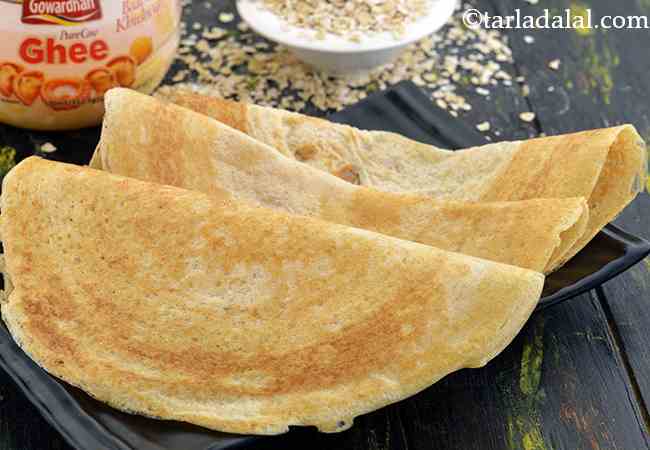126 calories for 1 Dal and Rice Dosa, Cholesterol 0 mg, Carbohydrates 14.8g, Protein 4.1g, Fat 5.6g. Find how much fibre, iron, calcium, zinc, magnesium, phosphorus, sodium, potassium, folic acid is present in Dal and Rice Dosa.
See Dal and Rice Dosa recipe | mixed dal dosa | South Indian mixed dal dosa | lentil dosa | with 30 amazing images.
dal and rice dosa recipe is made from mixed dals and rice. Learn how to make South Indian mixed dal dosa.
Quite different from the usual dosa in appearance and flavour, the Dal and Rice Dosa has a dominance of dal flavour, which combines beautifully with sambar and chutney.
As a more flavourful and aromatic variant, you can add finely chopped methi leaves or drumstick leaves to the batter before making this mixed dal dosa.
If doing so, make sure you chop the leaves real fine so that it does not hinder spreading of the mixed dal dosa.
Tips for dal and rice dosa recipe 1. Cover with a lid and keep aside to ferment the batter in a warm place for 12 hours. 2. Pour a ladleful of the batter on it and spread it in a circular motion to make a 225 mm. (9”) or 200 mm ( 8") diameter thin circle. 3. The batter should be of pouring consistency. 4. Cook on a medium flame for about 2 minutes till the dosa turns golden brown in colour and crisp.
Is Dal and Rice Dosa healthy?
Yes and No. So dal and rice dosa is healthy and not healthy at the same time and depends who is having it. Dosa is made up of urad dal, chana dal and rice and fats for cooking.
What's good in the dosa.
Urad Dal : 1 cup of cooked urad dal gives 69.30% of folic acid of your daily requirement of folate. The folic acid in urad dal helps your body to produce and maintain new cells, especially red blood cells. Being rich in Phosphorus it works with Calcium to build our bones. See here for 10 super benefits of urad dal.
Chana Dal : One cup of cooked Chana Dal provides 33% of your protein for the day. Chana dal is heart and diabetic friendly, also rich in fiber. Chana dal has high amount of potassium and low amount of sodium which makes it very effective in regulating your blood pressure. Read this article on complete benefits of chana dal.
What's the problem in the dosa?
Rice : Here are the pros for rice. Rice is a great source of complex carbohydrates, which is an important source of energy for our body. Rice is low in fibre and therefore a good option for people suffering from diarrhea. What's not good in rice. Foods like rice are high in GI are not suitable for weight loss, heart patients, diabetics as they affect the blood sugar control levels. See details of is white rice and parboiled rice good for you?
Can Diabetics, Heart patients and over weight individuals have Dal and Rice dosa?
Dosa is a moderate Glycemic Index recipe. Since, dosa has a high amount of rice which is rich in simple carbohydrates and it is fermented that is - it is pre digested, it does not prove to be a healthy option for diabetics, heart patients and weight watchers.
Diabetics can replace the rice with oats or ragi which will increase the fiber content and make recipes like Healthy Oats Dosa and Nachni Dosa.

Healthy Oats Dosa
Can healthy individuals have Dal and Rice Dosa?
Yes, they can. Dosa is a fermented food which is easy to digest. Fermentation of foods increases the bioavailability of nutrients which helps the body to assimilate more nutrition. The microorganisms break down the complex protein, carbohydrates and fat efficiently thereby helping to assimilate more nutrients from the food.
Dal and Rice Dosa is rich in below macronutrients, vitamins and minerals given in descending order (highest to lowest).
- Phosphorus : Phosphorus works closely with calcium to build bones. 12% of RDA.
- Folic Acid (Vitamin B9): Folic acid is an essential vitamin required throughout pregnancy. Folic acid rich Indian foods (kabuli chana, chana dal, yellow moong dal, urad dal, tooval dal, til ) 12% of RDA.
- Vitamin B1 (Thiamine) : Vitamin B1 protects nerves, helps in carbohydrate metabolism, prevents heart diseases and helps produce red blood cells. 10% of RDA.
- Fiber : Dietary fiber reduce the risk of heart disease, prevent the spike in blood sugar levels and hence super for diabetics. Consume more fruits, vegetables, moong, oats, matki, whole grains. 10% of RDA.
- Magnesium : Magnesium is required for formation of bones and teeth. It helps in the metabolism of calcium and potassium. % of RDA. magnesium rich Indian foods like leafy vegetables (palak, broccoli, kale), pulses ( rajma, chawli, moong ), nuts (walnuts, almonds) , cereals ( jowar, bajra, whole wheat flour, dalia). 8% of RDA.
- Protein : Protein is required for the managing the wear and tear of all cells of the body. Have protein rich Indian foods like paneer, curd, Greek yoghurt, tofu, almonds, sprouts, chana, rajma, chick peas, quinoa, buckwheat ). 7% of RDA.
How to burn 126 calories that come from Dal and Rice Dosa?
Walking (6 kmph) = 38 mins
Running (11 kmph) = 13 mins
Cycling (30 kmph) = 17 mins
Swimming (2 kmph) = 22 mins
Note: These values are approximate and calorie burning differs in each individual.